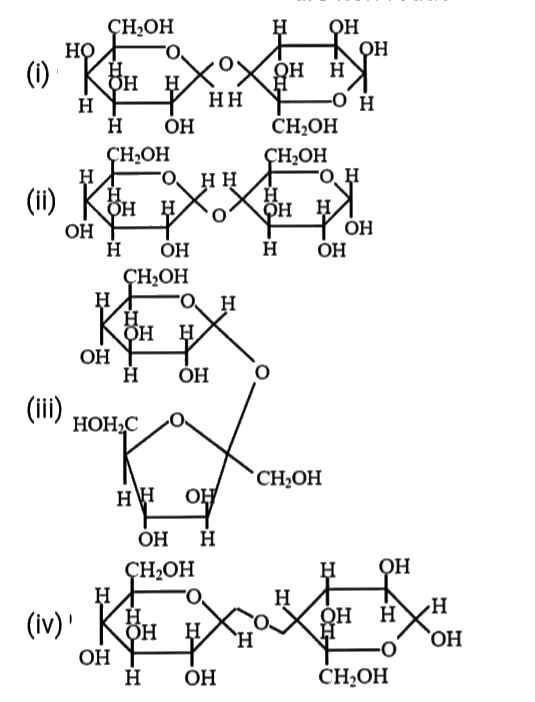Which one of the following is a non-reducing carbohydrate?
Ribose 5-phosphate
Malotose
Sucrose
Lactose
The correct Answer is:C
To determine which of the following carbohydrates is a non-reducing carbohydrate, we will analyze each option provided: ribose 5-phosphate, maltose, sucrose, and lactose.
1. Understanding Non-Reducing Carbohydrates:
- Non-reducing carbohydrates are those that cannot be oxidized by weak oxidizing agents. This is primarily because they lack certain functional groups, specifically the aldehyde (CHO) or ketone (C=O) groups that are necessary for oxidation.
2. Identifying the Functional Groups:
- Carbohydrates with free aldehyde or ketone groups can be oxidized and are termed reducing sugars. Non-reducing sugars do not have these functional groups available.
3. Analyzing Each Option:
- Ribose 5-Phosphate: Ribose is a pentose sugar that contains an aldehyde group, thus it is a reducing sugar.
- Maltose: Maltose is a disaccharide made of two glucose units and has a free aldehyde group, making it a reducing sugar.
- Sucrose: Sucrose is a disaccharide composed of glucose and fructose. It does not have a free aldehyde or ketone group because the glycosidic bond formed between glucose and fructose involves the anomeric carbons of both sugars. Therefore, sucrose is a non-reducing sugar.
- Lactose: Lactose is a disaccharide made of glucose and galactose, and it contains a free aldehyde group, making it a reducing sugar.
4. Conclusion:
- Among the options given, sucrose is the only non-reducing carbohydrate because it lacks the necessary functional groups for oxidation.
Final Answer:
Sucrose is the non-reducing carbohydrate.
- Non-reducing carbohydrates are those that cannot be oxidized by weak oxidizing agents. This is primarily because they lack certain functional groups, specifically the aldehyde (CHO) or ketone (C=O) groups that are necessary for oxidation.
- Carbohydrates with free aldehyde or ketone groups can be oxidized and are termed reducing sugars. Non-reducing sugars do not have these functional groups available.
- Ribose 5-Phosphate: Ribose is a pentose sugar that contains an aldehyde group, thus it is a reducing sugar.
- Maltose: Maltose is a disaccharide made of two glucose units and has a free aldehyde group, making it a reducing sugar.
- Sucrose: Sucrose is a disaccharide composed of glucose and fructose. It does not have a free aldehyde or ketone group because the glycosidic bond formed between glucose and fructose involves the anomeric carbons of both sugars. Therefore, sucrose is a non-reducing sugar.
- Lactose: Lactose is a disaccharide made of glucose and galactose, and it contains a free aldehyde group, making it a reducing sugar.
- Among the options given, sucrose is the only non-reducing carbohydrate because it lacks the necessary functional groups for oxidation.
Sucrose is the non-reducing carbohydrate.
Topper's Solved these Questions
- ANIMAL TISSUES BOOK - TRUEMEN BIOLOGY ENGLISHCHAPTER - ANIMAL TISSUES EXERCISE - MULTIPLE CHOICE QUESTIONS
193 Videos
- CELL- THE BASIC UNIT OF LIFE ( CELL AND ITS STRUCTURAL ORGANISATION )BOOK - TRUEMEN BIOLOGY ENGLISHCHAPTER - CELL- THE BASIC UNIT OF LIFE ( CELL AND ITS STRUCTURAL ORGANISATION )EXERCISE - MULTIPLE CHOICE ANSWER TYPE
308 Videos
Similar Questions
Knowledge Check
Which one of the following is a reducing sugar?
AA) MaltoseBB) CelluloseCC) GlucoseDD) SucroseWhich of the following is non-reducing sugar ?
AGlucoseBSucroseCMaltoseDLactose
Which of the following are non-reducing sugars -

View SolutionWhich of the following is not reducing sugar.
View SolutionWhich of the following are non - reducing sugars ?
View SolutionWhich one of the following is a non- vascular embryophyte ?
View SolutionWhich of the following is not a reducing agent ?
View SolutionWhich one of the following statements about carbohydrates is wrong ?
View Solution